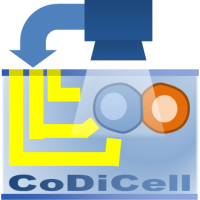Presentation of the project
The ambition of the CoDiCell project is to develop innovative methodologies for the trajectory control of large populations of biological cells inside fluidic chips at high speed. It proposes to combine the approaches coming from the microfluidics and the microrobotics communities. Microfluidic chips ensure fast and long range displacements of large population of cells while microrobotics develops precise control of the trajectory of individual cells. The aim of the CoDiCell project is to develop basic scientific knowledge to perform precise trajectory control of individual cells for large scale populations at high speed.
These methodologies will be directly applied to create a new generation of chips dedicated to automated cell sorting, the smart cell sorters, at unprecedented selectivity. Two major advances are foreseen: (i) the real time control of the sorting step based on the output of position sensors that guarantee the correct sorting and (ii) the ability to test directly the biological affinities between two cells by controlling their trajectory and bringing them in close vicinity.
This project paves the way to adoptive cell therapy (ACT) for anticancer treatments. This innovative and highly personalized technique is based on the cloning of naturally occurring tumor-reactive lymphocytes. However, in most cases, this treatment must face a major challenge: the identification of these rare natural lymphocytes having a concentration lower than 0.1%, which is beyond the detection level of current techniques. CoDiCell proposes a sorting device which consists in placing the lymphocytes one by one in front of tumor cells by means of dielectrophoretic actuation and in identifying the lymphocytes which bind to the tumor cells. The targeted lymphocytes are then collected in a dedicated microchannel.
The major challenge in this project is due to the large number of cells that must be tested individually in a restricted time. This implies to be able (i) to perform high speed trajectory control so that a large number of lymphocytes can be sorted per second, (ii) to perform simultaneous control of a large number of lymphocytes to parallelize the sorting and (iii) to perform precise trajectory control of individual lymphocytes inside a fluidic chip to test their biological affinities with tumor cells. Three scientific challenges will be tackled: (i) the modelling of the chip including both the fluidic aspects and the dielectrophoretic ones; (ii) the determination of control laws dedicated to the non-linearity of the dielectrophoretic field and to the fluid movements occurring in the fluidic chip and (iii) the definition of detection and tracking algorithms dedicated to innovative position sensors (event based sensors and impedance spectroscopy measurements) which guarantee the rapidity and parallelization of the detection.
CoDiCell is based on a unique consortium with experts from different fields and different countries that will make possible significant scientific advances in control of a large population of cells applied to a promising application domain: the ultra-selective cell sorting.

